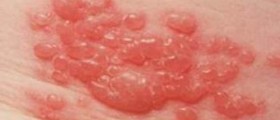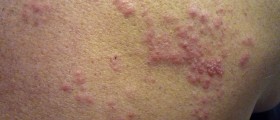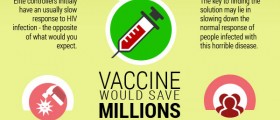
Eczema herpeticum is a serious skin condition characterized by skin rash which is made of many blisters initiated by Herpes simplex virus. In the majority of cases people who have contracted the virus develop cold sores on the lips, nose or inside the oral cavity. However, in case of eczema herpeticum vesicles tend to cover larger portions of the skin.
The condition can be quite severe when large portions of the skin get covers with small blisters filled with a liquid pus. The person may also develop fever.
Eczema Herpeticum - the Onset and Progression
Eczema herpeticum develops once the person suffering from skin rash additionally contract Herpes simplex virus. Normally, healthy individuals who get infected with the virus develop only cold sores. On the other hand, individuals with recurring skin condition are prone to develop eczema herpeticum if they are suffering from active skin disease and get in contact with Herpes simplex virus.
These patients typically experience high fever and their skin is covered with rash comprising small blisters usually filled with pus-like liquid. There is also an overall feeling of being off.
Blisters and typical skin rash form 5-12 days after coming into a contact with the virus. Initially, the skin already affected with eczema starts to change and becomes covered with multiple clear water fluid filled blisters. If not recognized and diagnosed on time, blisters may easily spread, affect large portions of the skin and even occur in the healthy parts of the skin, those not affected by the eczema in the first place. Later, blisters get filled with pus (secondary bacterial infection), may also bleed and the entire process ends up with crusting. Blisters are rather painful. Sometimes patients may additionally suffer from swelling of regional lymph nodes.
Eczema Herpeticum Complications
If the infection is not diagnosed and treated on time, a person may face with many different complications. For instance, the infection can spread to the eyes and cause blindness scars. Furthermore, in rare cases eczema herpeticum may progress into a systemic infection and cause damage to many internal organs. Finally, the skin affected by eczema herpeticum becomes more susceptible to secondary bacterial infection. One of the most complex bacterial infections is the one caused by Staphylococcus aureus.
Eczema Herpeticum Treatment
Most patients are prescribed antiviral drugs such as acyclovir or Valacyclovir. Immunocompromised patients may receive foscarnet. Secondary bacterial infection always requires a course of antibiotics.
And finally, individuals suffering from chronic and recurrent skin conditions who happen to notice any change in their skin lesions should consult their health care providers immediately.

















Your thoughts on this
Loading...